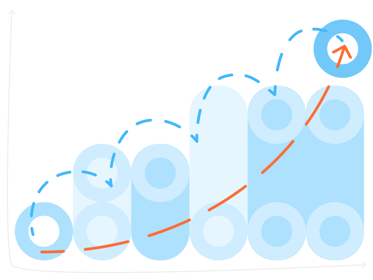-
 Written by Sean Dougherty
Written by Sean DoughertySenior Brand Creative at Funnel, Sean has more than 15 years of experience working in branding and advertising (both agency and client side). He's also a professional voice actor.
As we grow older, our worldviews shift according to our lived experiences. We learn how to manipulate the environment around us to help us thrive and co-exist with each other. In short, as we grow, we mature — some of us at different rates than others.
Just like people, businesses grow and evolve, too. This is especially true when it comes to data maturity.
In a world awash with data, businesses are urged to be “data-driven,” but what does that actually mean? The answer lies in a concept called data maturity – a measure of how effectively a business can utilise its data. In this blog, we’ll explore what data maturity is, why it matters, and the five key stages of this journey.
What is data maturity?
Put simply, data maturity is the capacity of a business to work with data and make data-driven decisions. This includes the business’ ability to perform data analysis, handle it, extract meaningful insights, and act on those insights to grow.
At the conception of a business, there may be low data maturity across the organization. While data may be generated, it will likely be dealt with haphazardly as the business focuses its energy on generating reliable, sustainable revenue streams.
As businesses grow, though, they begin to realize their data’s value and begin to set strategies to capitalize on that value. They invest in data literacy initiatives and begin on their data maturity journey.
Why is data maturity essential?
Data is everywhere, from a marketing department through to finance and human resources. We also have access to powerful technologies and tools that allow us to quickly calculate various valuable metrics from this pool of data. This means we have the power of untapped game-changing insights at the tip of our fingers.
Business executives understand this dynamic. Innovative leaders are looking to all their teams to dig into their data to find nuggets of wisdom that can lead to greater market share for the organization.
That means that every business and department is on a journey to become more data fluent. The catch: we know that many marketers lack confidence in their own ability to work with data. They see the increasing digitalization of the world around them and feel they are struggling to keep up.
But becoming more data mature allows businesses to:
• Make informed decisions, avoiding guesswork
• Predict shifts in customer behavior
• Enhance compliance, governance, and security
.png?width=688&height=361&name=maturity%20(2).png)
The effects of data maturity include making better decisions, future-proofing your business and meeting regulations.
Following in the footsteps of Ford
We don’t need to look too far back into history to uncover a perfect case study in how data maturity can rescue a business.
Under the leadership of Alan Mulally from 2006 to 2014, Ford experienced an epic turnaround in their fortunes. An often repeated mantra during Mulally’s tenure was, “data will set you free.”
The thinking goes that executives who base their decisions on sound data will experience greater performance. When an organization's data maturity is high, they can be better prepared for problems when they happen.
In fact, following some moves considered quite controversial at the time, Ford’s data-driven approach meant the company was able to remain solvent during the 2008 financial crisis – unlike their two major rivals, General Motors and Chrysler.
The impact of data maturity on marketing
Our access to (and ability to work with) data is growing exponentially. At the same time, the platforms and channels available to marketers continue to grow and become more fragmented.
To make sense of this abundance of choice, marketers need to maximize their powerful new tools in order to understand where their investments can have the most impact.
Particularly when economic times are difficult, marketers can’t afford to simply “spray and pray” in their marketing. That is to say, they can’t spend money blindly across the board to see what works.
Rather, marketers need to make data-driven decisions, informed by their insights. The good news for marketers is that, as an organization's data maturity increases, they gain increased capabilities to understand how and where customer behaviors will shift.
.png?width=1200&height=423&name=brief%20quote%20(2).png)
When data maturity is high, businesses are better prepared.
Data maturity and compliance
It’s not just marketing that benefits along the data maturity journey. Higher levels of data maturity empowers organizations to identify and mitigate security risks more effectively while ensuring compliance with regulatory requirements. With robust data governance practices in place, it’s easier to protect sensitive data. Mature data management gives organizations the ability to meet regulatory obligations by establishing frameworks and processes that align with industry standards and best practices, and creating a culture of security and accountability throughout the organization.
How do you become more data mature?
Understanding the full spectrum of maturity is essential to become more data-mature. While every business is unique, there are 5 main stages of data maturity that a business can build a data maturity model on:
Each one of these data maturity stages represents a deeper integration of data into decision-making processes, moving from simply gathering data to fully leveraging it for strategic advantage.
.png?width=688&height=461&name=journey%20(1).png)
A data maturity journey takes time, but breaking it down into smaller steps can help reach your goals.
Basic
Let’s start at the ground floor. A business with a basic level of data maturity can hold accurate and stable data in one place. This stage in your data maturity model really is the foundation for any data strategies going forward.
Businesses at this data maturity stage collect data but often rely on manual processes and inconsistent reporting. Analytics are primarily reactive, addressing immediate questions rather than driving proactive strategy.
At this point, your business may not be aware of data governance, or the compliance requirements around data management. You may lack clear policies, accountability, or oversight for managing data. Data may be fragmented, with little consistency or standardization across the organization. Without stable data in one single source of truth, you can’t draw any meaningful or actionable conclusions from your data.
Intermediate
In the second stage of the data maturity model, businesses are able to easily and automatically report on their data. In a marketing context, this may include setting up a data pipe for automatic data collection from various ad platforms which then sends it to a single report.
By reaching this data maturity stage, your organization is afforded much more time to focus on critical thinking and data analysis. Your teams can perform higher-value work as opposed to manual data entry. At this point, organizations begin to recognize the importance of data governance and may start to establish basic governance structures and processes. This may involve defining roles and responsibilities for data management, establishing data stewardship programs, and implementing foundational policies for data quality, security, and privacy.
Advanced
We are starting to get into some juicy stuff now. In phase three of your data maturity model, you can uncover deeper customer insights by working with more data and performing more granular analysis.
Many (if not all) of your data management practices process are automated at this stage, allowing you to quickly analyze data on a macro and micro scale. Marketers can review performance of singular ad creatives and review their contribution to the rest of a campaign's performance. At this point in the data journey, your data strategy will be in line with your business goals and you’ll be able to make solid data-driven decisions.
Expert
We view data maturity most often through the lens of a marketing department. From this perspective, phase four of your data maturity journey is all about connecting your marketing data to other parts of the business.
Data governance processes at this point will be standardized and integrated across the organization, and there is a focus on ensuring compliance with regulatory requirements and industry standards.
Here, you will begin to see the impact of marketing on the commercial ecosystem and the entire business. Marketing data can start to influence some broader business decisions.
For example, a business with expert data maturity, looking to open an additional location (say, a restaurant franchise), could analyze SEO data to determine where search intent is most concentrated according to the businesses offering. Combined with sales KPIs that paint a concrete picture of the core customer and marketing analytics around acquisition costs, the business can make an informed decision about which future market offers the greatest possibility.
Master
The padawan has become the Jedi master. You’ve scaled your data maturity model and you’re an expert. With this high data maturity, you are so comfortable working in data that you view it as a strategic, critical asset that is vital to your decision making. You’ll use predictive models to inform data collection, understand customer behavior and anticipate future needs. The business itself will enjoy a data-driven culture, prioritizing data literacy and education.
With this level of data maturity, you can implement advanced analytics and modeling like MMM to anticipate how spending shifts can influence revenue while leveraging machine learning to predict future customer behaviors.
Various kinds of data maturity models
The five stages of data maturity above are our own spin on the general concept. We use this to help our customers in their journey to become more data mature. However, many different ways exist to view the spectrum of data maturity possibilities. While some of the more popular models and frameworks feature five stages that are very similar to ours, some also feature just four stages.
Additionally, different frameworks can define those stages slightly differently. For instance, IBM’s data maturity model tends to view this journey through the lens of data processes. You become more mature as those processes become more defined and complex, and you grow as you view data more as a strategic asset. Other models may also put more emphasis on data management and data governance.
Strategies to become more data mature
To start your own journey toward greater data maturity, it may serve you well to take some inspiration from the IBM framework. In other words, begin assigning some processes around for working with data.
Once you have a basic framework for your data process, do a data maturity assessment and look at the tools you are using. You should move beyond limited data-collection tools like an ETL or data pipe and instead take advantage of a marketing data hub to automate, clean and visualize your data.
With processes and more powerful tools sorted out, you can then experiment with more advanced forms of analysis. Next thing you know, you may be connecting your data to other areas of your organization and positioning your marketing data as the proverbial light in the storm for the entire business.
Also read: What is data reliability?
Greater data maturity is a wise move
The world is awash in data, with increasingly powerful tools at our disposal that can make sense of all of this digital information. The businesses that can leverage this data the best will grow the most. The advanced insights that they are able to unlock will give them incredible power over their competitors, meaning greater growth and success.
And it all starts with a focus on increasing your data maturity.
It almost flips the old Spider-Man axiom on its head: with great data maturity comes great power.
-
 Written by Sean Dougherty
Written by Sean DoughertySenior Brand Creative at Funnel, Sean has more than 15 years of experience working in branding and advertising (both agency and client side). He's also a professional voice actor.
